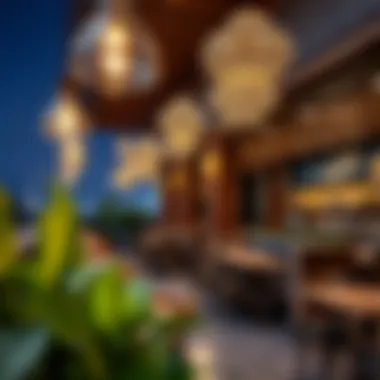Discovering Diverse Iftar Dining in Dubai


Intro
During Ramadan, the city of Dubai transforms into a culinary wonderland, especially when it comes to Iftar dining. As the sun sets, residents and travelers alike gather to break their fast with sumptuous meals that blend tradition, culture, and innovation. This article aims to shed light on the various Iftar restaurants scattered throughout the city, each offering a unique experience that reflects both local and international flavors.
The dessert offerings, rich spices, and aromatic dishes are more than just food; they are a celebration of community and faith. Travelers and locals, whether seasoned or unfamiliar with Ramadan customs, find themselves drawn into the lively atmosphere that these dining spots offer. With an array of options—from lavish buffets to intimate dinners—there is something for everyone in this vibrant culinary scene.
With that in mind, let’s explore the enchanting world of Dubai’s Iftar restaurants, highlighting key experiences and the cultural significance that accompanies the breaking of the fast.
Understanding Iftar in Dubai
Iftar, the meal that breaks the fast during Ramadan, holds a profound meaning in the cultural and social fabric of Dubai. Each evening at sunset, families, friends, and communities gather to share a meal that is filled with tradition and togetherness. Understanding Iftar in Dubai goes beyond just food; it's about the essence of hospitality and the joy of reconnecting with loved ones after a day of fasting.
This article delves into the various dimensions of Iftar, shedding light on its significance in Islam and its role in fostering community spirit. The very act of coming together to break bread is a reflection of shared values, respect for traditions, and the beauty of diverse cultures coming together during a holy month.
Considerations around Iftar dining are essential for both local residents and visiting tourists. For expatriates, it offers an opportunity to immerse themselves in the rich traditions of the region, while tourists can experience authentic Middle Eastern cuisine and hospitality.
Cultural Significance
The cultural significance of Iftar in Dubai is deeply rooted in Islamic traditions. Ramadan is viewed as much more than a time of fasting; it teaches virtues such as patience, generosity, and compassion. During Iftar, it’s common for people to invite neighbors and those in need to join in the meal, exemplifying the communal spirit that defines much of Emirati culture. The frugal act of sharing a plate is a testament to solidarity and social responsibility.
In many Dubai restaurants, special Iftar menus showcase the best of local culinary arts, featuring traditional dishes like dates, lentil soup, and lamb dishes, reflecting a connection to the land and its history. With each bite, one can taste the heritage and hospitality that the city prides itself on.
Historical Context
Historically, Iftar has evolved alongside the many cultures that have passed through Dubai. Initially, the food served during Ramadan was simple and utilitarian, focused primarily on sustenance to break the fast after long days. However, as Dubai transformed into a hub of trade and culture, the Iftar dining scene blossomed.
The influx of diverse nationalities brought new flavors, techniques, and ideas to the Iftar table. Today, it is not uncommon to find an array of international cuisine offered in Dubai's restaurants during Ramadan, such as Indian biryani, Pakistani kebabs, and even fast food still featuring prominently alongside traditional Emirati dishes.
This blending of flavors signifies the cosmopolitan nature of Dubai. The community's evolution reflects broader global trends, where traditional customs are respected and celebrated but also adapted to meet modern tastes and sensibilities. In this way, Iftar in Dubai stands as a vibrant testament to the city's historical and cultural journey.
The Culinary Landscape of Iftar
The culinary offerings during Iftar in Dubai offer a fascinating blend of tradition and modernity, showcasing the rich history of the region while adapting to contemporary tastes. This section highlights how the culinary experiences available during Ramadan play a pivotal role in enhancing community bonds, stimulating the senses, and promoting local businesses. Understanding the culinary landscape of Iftar is essential for individuals keen on fully engaging in one of Ramadan's most cherished rituals.
Traditional Dishes
When it comes to Iftar, traditional dishes are the cornerstone of the dining experience. Classics like dates and water often mark the breaking of the fast, but they also set the stage for a feast filled with beloved regional flavors. Each dish resonates with cultural significance, creating a sense of belonging and nostalgia among diners.
Commonly served favorites include Harees, a dish made from wheat and meat, and the ever-popular Samboosa, a pastry stuffed with vegetables or meat that bursts with flavor. The chewy, tender Knafeh, a dessert made with fine noodle-like pastry soaked in syrup, warms the hearts of many, emphasizing the season's sweet spirit. During Iftar, these dishes are often prepared with utmost care, making their presentation a feast for the eyes as well.
These meals do not just satisfy hunger; they serve as a bridge connecting generations. Visiting a restaurant during this time is like stepping into a living history lesson, where flavors speak of home, family, and tradition. Beyond taste, these meals also encourage the practice of sharing, as food is prepared in abundance and shared across the table.
Modern Interpretations
While traditional dishes play an essential role in Iftar, eateries across Dubai have embraced modern culinary trends, infusing their menus with new twists on classic recipes. The city's diverse population has spurred creativity, leading to unexpected yet delightful interpretations of familiar favorites.
In many upscale restaurants, you might find Lamb Shawarma Tacos or Sushi with Arabic spiced fillings, merging Eastern and Western flavors in inventive ways that captivate the palate. Chefs are increasingly experimenting with ingredients and techniques from around the globe, crafting dishes that tell stories of cultural exchange while retaining the soul of Iftar.
Moreover, with a greater emphasis on health and nutritional value, many modern Iftar menus include lighter options that celebrate fresh ingredients without compromising flavor. Quinoa Tabouleh or Grilled Shrimp with Garlic Sauce can often be seen on these menus, appealing to health-conscious diners while still honoring traditional flavors.
International Flavors
The culinary richness of Dubai during Iftar isn’t confined to local cuisine alone; international flavors are increasingly making their mark on Iftar dining experiences. Given the cosmopolitan nature of Dubai, one can savor a multitude of global dishes that cater to diverse tastes.
For instance, one might enjoy Turkish Kebabs, Indian Biryani, or Lebanese Mezze, showcasing how culinary traditions from various regions harmoniously coexist. This international flair enriches the dining experience, allowing patrons to travel the world through their taste buds while sitting in one of Dubai's many vibrant restaurants.
Here, the beauty of Iftar becomes even more pronounced: it’s not exclusively about breaking fast; it’s about showing hospitality and inclusiveness, welcoming flavors from around the world and uniting everyone in celebration. Furthermore, sharing dishes from different cultures fosters a sense of community and understanding among the diners, turning every meal into a moment of connection.
"Iftar is not just a meal; it's a cherished ritual that brings us together, helping us break bread and barriers alike."
Thus, the culinary landscape of Iftar in Dubai extends far beyond just food. It's an immersion into a cultural tapestry where traditional values coexist with global influences, making it a unique experience that appeals to both locals and expatriates. As you explore these diverse offerings, it becomes clear that the communal aspect of dining in this city offers much more than sustenance; it builds bridges between cultures and traditions.
Trending Iftar Restaurants in Dubai


As Ramadan unfolds, Dubai becomes a vibrant tapestry of flavors and aromas, especially during Iftar. The term "Trending Iftar Restaurants in Dubai" reflects a growing enthusiasm not just for food, but for shared experiences. Restaurants that provide distinctive Iftar offerings are crucial in creating memorable moments for both locals and tourists. These restaurants are a reflection of Dubai’s cultural mosaic, where diverse traditions converge to celebrate breaking the fast.
Luxury Dining Options
When it comes to luxury dining during Iftar, establishments like the Burj Al Arab's Al Iwan stand out. Here, guests can enjoy an opulent buffet featuring dishes like saffron-infused biryani and grilled lamb chops. The ambiance is nothing short of exquisite; chandeliers shimmer, and the sounds of gentle Arabic music fill the air. This type of dining not only elevates the culinary experience but also emphasizes the significance of Iftar as a time of gathering and reflection.
Another example of luxury is At.mosphere in the Burj Khalifa. With its breathtaking views and style, it’s a place where two worlds collide—gourmet dining and stunning vistas. Diners can savor culinary delights while overlooking the dazzling cityscape, making it a meal to remember.
The allure of these restaurants lies in their attention to detail. High-end venues often provide not just a meal, but an experience that includes personalized service and exclusive menus, which makes Iftar a truly special occasion.
Casual Dining Experiences
For those looking for a more laid-back atmosphere, Dubai’s casual dining scene is illuminating. Venues like Ravi Restaurant come to life during Iftar, serving traditional Pakistani dishes. The charm of casual dining is that it captures the essence of community. Patrons often find themselves sharing dishes like chicken curry, lentil dal, and samosas. Here, the focus shifts to flavor and comfort rather than formality, which in itself is a rich part of the Iftar experience.
In addition, Karak House introduces a fun twist. While it's famous for its karak tea, the simple yet delicious Iftar menu includes street food staples that easily draw crowds. The convivial spirit in these venues allows guests to enjoy their meals in a relaxed setting, catching up with friends and family.
Family-Friendly Venues
Family-friendly venues provide a vital role in the Iftar dining scene, ensuring that both younger guests and adults have a delightful experience. Saffron at Atlantis, The Palm caters to families with a wide range of themed dining options. With an extensive kids’ menu and interactive eating experiences, parents can relax knowing their children are entertained. The buffet here tends to cover all bases, featuring everything from high-quality seafood to decadent desserts.
Additionally, Buffalo Wild Wings creates a unique Iftar offering that focuses on American-style comfort food but with an Arabic twist. The relaxed ambiance is ideal for families where laughter and chatter enrich the Iftar experience, ensuring that everyone leaves with satisfied cravings and smiles.
Unique Thematic Experiences
Dubai takes delight in the unusual, and this extends to its Iftar offerings as well. Restaurants like Souk Al Bahar not only present food but weave narratives through themed dining experiences. They often hold cultural nights, where guests can enjoy Iftar while engaging in storytelling and live performances, showcasing the stories behind the dishes served.
Another captivating venue is Dubai Opera's rooftop restaurant, where guests can dine against the backdrop of incredible views. The restaurant often features live music to enhance the communal nature of Iftar, emphasizing connection among diners. Thematic experiences like these not only invigorate the palate but also enrich the cultural understanding of Ramadan.
The lively atmosphere of thematic culinary experiences allows guests to connect with community while enjoying the joys of Iftar, making the meal one to cherish.
Ambiance and Decor
The experience of enjoying Iftar in Dubai goes beyond just the food served on the table. The ambiance and decor of Iftar restaurants play a crucial role in shaping the dining experience. Just like a good book, the atmosphere around the meal provides a narrative that can evoke feelings of community, celebration, and tranquility. When you step into an Iftar restaurant, you're not merely entering a dining space; you're being transported into an environment that reflects tradition, modernity, and comfort.
For investors and restaurateurs, elevating the ambience can lead to increased patronage. Families, friends, and business associates gather at Iftar with intent to relish the moment, making the aesthetics of their surroundings paramount. A well-thought-out decor can enhance the overall experience and become a critical influencing factor for diners when choosing where to break their fast.
Creating the Right Atmosphere
To create the right atmosphere for an Iftar gathering, several elements come into play. The layout should promote interaction; tables arranged for intimate gatherings or larger groups can impact social dynamics significantly. Furthermore, the selection of colors, furnishings, and decorations should reflect cultural elements, often incorporating traditional motifs blended with contemporary aesthetics.
- Textiles and Patterns: Rich fabrics and intricate patterns not only celebrate the cultural essence but also add a layer of warmth to the dining experience.
- Seating Arrangements: Comfortable seating encourages diners to linger, share stories, and connect with each other, turning a meal into a cherished memory.
- Cultural Touchpoints: Utilize art, calligraphy, or local crafts in decoration to enhance the environment, surrounding diners with a sense of place and identity.
The atmosphere can have tangible effects. A welcoming and well-designed space can lead to better customer satisfaction and return visits, a key metric for success in the hospitality industry.
Significance of Lighting
Lighting serves not just as a functional necessity but as a transformative art that affects mood and perception. In Iftar restaurants, the right lighting can evoke the sacredness of Ramadan while making the space feel inviting.
"Lighting sets the stage for the dining experience, guiding the attention of diners, and enhancing their enjoyment."
- Soft Glows and Candles: Using soft, warm lighting can create a cozy and inviting atmosphere. Dimmers can allow for adjustment as the sun sets, mimicking the natural progression of the day and the breaking of the fast.
- Cultural Illumination: Incorporating lanterns or traditional lamps can enrich the space, connecting diners to their heritage and traditions.
- Highlighting Elements: Strategic lighting can draw attention to buffet areas or special dishes, enticing diners while creating a visually stimulating environment.
Pricing and Value
The importance of pricing and value in the context of Iftar dining in Dubai cannot be overstated. With a city that boasts a rich tapestry of culinary options, understanding the price spectrum and value these restaurants deliver becomes crucial, especially during Ramadan when traditional norms evolve. Individuals are keen to ensure that their dining experiences are not only memorable but also worth every dirham spent.
Evaluating costs involves more than just looking at menu prices. It's about recognizing the depth of experience offered, from the quality of ingredients to the atmosphere created within these establishments. As such, comparing Iftar menus at various locations sheds light on what patrons can expect in terms of both monetary outlay and overall satisfaction.
Comparative Analysis of Costs
When you set out for Iftar in Dubai, the range in pricing across different restaurants can be quite startling. Upscale venues might charge a premium, often presenting lavish buffets with an extensive selection of traditional dishes. For instance, restaurants in luxury hotels like the Burj Al Arab or the Armani Hotel might offer lavish spreads priced anywhere from 200 to 400 dirhams per person. In contrast, more casual eateries and local diners may provide equally delightful meals for half that price or less, giving diners a chance to taste authentic flavors without breaking the bank.
Here’s a breakdown to illustrate the variance:
- Luxury Venues: 200 - 400 AED per person
- Mid-range Restaurants: 100 - 200 AED per person
- Casual Dining: 50 - 100 AED per person


Such differences present options for every type of budget and preference, making it possible for families and groups of friends to find the right place without sacrificing quality or experience. It's essential to take the time to analyze what's included with those prices — some venues provide complimentary beverages and desserts, while others rely on add-ons that can significantly inflate the final bill.
Understanding Menu Variability
The dynamic nature of Iftar menus during Ramadan is a significant factor that affects pricing. Many restaurants adapt their offerings to cater to a diverse clientele, leading to a variety of package deals and customized choices. Seasonal ingredients often play a role here, as the use of fresh, local produce can alter the pricing structure. Moreover, some restaurants offer innovative fusion dishes alongside traditional ones, which influences both the appeal and the cost.
A comprehensive understanding of these menus allows diners to pinpoint their preferences more effectively.
- Traditional Offerings: Often found at lower price points in local spots, these dishes are deeply rooted in culture.
- Modern Twists: Higher in cost but often worth it for unique interpretations of classic meals.
- Family Packages: Budget-friendly combinations that encourage sharing and exploration.
By delving into menu variability, diners can appreciate the various factors that play into their overall experience. As they weigh the options, they gain insights not just into what they want to eat, but also how much they are willing to spend for that experience.
Ultimately, understanding pricing and value adds layers of thought to the Iftar dining experience, ensuring that each meal is not just a matter of sustenance, but a moment to savor and celebrate.
Reservation Trends
In the bustling heart of Dubai, the significance of reservation trends during Iftar cannot be overstated. As the sun sets and the call to Maghrib rings out, restaurants across the city transform into vibrant gathering spots for families and friends breaking their fast. To navigate this thriving culinary landscape effectively, understanding the nuances of advance bookings and walk-in policies will enhance your dining experience.
Advance Bookings
One of the essential trends is the push for advance bookings, especially at popular eateries. As the Ramadan season draws near, customers begin securing tables long before the fasting month starts. Making an early reservation guarantees not just a seat, but peace of mind. Here are key benefits of advance bookings:
- Guaranteed Table: No one enjoys the feeling of being turned away during the busy evenings. By reserving in advance, diners ensure they have a spot ready and waiting.
- Special Menus: Many establishments craft unique Iftar menus that can often be exclusive to those who reserve. This often leads to discovering new culinary delights that enhance the evening.
- Group Considerations: Whether it's an intimate family gathering or a larger celebration with friends, creating a reservation accommodates varying group sizes and ensures everyone can enjoy the festive meal together.
It’s wise to utilize apps and websites for the booking process, as they often provide insights into what's trending and popular, along with user reviews.
Walk-in Policies
Despite the convenience of reservations, many restaurants in Dubai accommodate walk-ins, but this policy can vary significantly. Here are some factors to consider when deciding to dine without a reservation:
- Last-Minute Decisions: Not everyone plans their Iftar dining experience well in advance. Some may choose to go with the flow, which means walking into a restaurant can sometimes bring unexpected delight.
- Flexibility: Walk-ins can enjoy spontaneity, allowing them to explore different restaurants based on mood or location without being tied down to a particular dining time or place.
- Availability: On a less crowded evening or at lesser-known venues, walk-ins can often find a table with little wait. However, during peak times, the risk of being turned away increases.
The bustling atmosphere of Iftar in Dubai is enriched by both the careful planning of advance bookings and the adventurous spirit of walk-in diners. Understanding these trends can make or break your experience, ensuring a delightful evening of food, family, and festivity.
"Reservations during Ramadan aren't just about planning; they're about ensuring you’re part of the shared experience that defines Iftar in Dubai."
For additional insights into dining trends in Dubai, visit Wikipedia or Britannica.
Adapting to these reservation trends can pave the way for a memorable Iftar experience that resonates beyond just a meal.
Influence of Social Media
Social media plays a pivotal role in shaping the dining landscape, especially during Ramadan in Dubai. As Iftar becomes an integral part of the cultural fabric, platforms like Instagram, Facebook, and Twitter make it easier for eateries to showcase their unique offerings. Not only do these channels enable restaurants to reach a wider audience, but they also generate buzz around their Iftar menus, significantly influencing consumer behavior.
The impact of social media isn’t just limited to advertising food; it’s about creating a communal experience. When people share their Iftar moments online, they invite others to join in. The thrill of breaking fast together—even if virtually—enhances the cultural essence of Ramadan. Additionally, social media acts as a barometer for a restaurant’s popularity. Diners tend to flock to establishments that have high engagement on these platforms, leading to an influx of reservations and a surge in foot traffic.
Impact on Popularity
Restaurants that harness the power of social media often find a remarkable boost in their popularity. For instance, a myriad of posts tagged with location filters can turn lesser-known eateries into hotspots. Customers are drawn to venues that feature visually appealing dishes, and the immediacy of social media allows a restaurant to tap into trends quicker than old-school marketing methods could ever dream of.
Furthermore, the way Iftar restaurants present their food and ambiance on social media can significantly affect their reputation. Stunning images of traditional dishes like dates and energizing drinks attract attention, while timely updates about special offers or specific Iftar timings keep the audience engaged. As patrons share their experiences through photos and stories, they inadvertently become brand ambassadors, expanding the restaurant’s reach without spending a dime on advertising.
User-Generated Content
User-generated content (UGC) has changed the game for Iftar dining in Dubai. Essentially, every post that a customer shares can serve as a mini-advertisement for the restaurant, showcasing authentic experiences through their eyes. This type of content carries weight; it’s often seen as more trustworthy than promotional material coming directly from the restaurant itself.
Restaurants that encourage diners to take and post photos are likely to benefit from the exposure. By creating a hashtag tied to their name or Iftar theme, eateries can monitor engagement while also creating a sense of community. When a hashtag trends, everyone wants to be part of the conversation; therefore, more patrons are inclined to visit the restaurants tagged in popular posts.
To leverage this effectively:
- Encourage Tags and Hashtags: Invite customers to share their experiences through social media tags. This not only builds community but also serves as free advertising.
- Feature Customer Posts: Showcasing UGC on the restaurant’s page builds loyalty and encourages more patron engagement.
- Host Photo Contests: Giving diners an incentive to share their experiences can spread the word quicker than any advertisement ever could.
"In the age of social media, the best publicity an Iftar restaurant can get comes from satisfied customers sharing their meals online."
Through these activities, restaurants can amplify their reach while simultaneously providing an inviting atmosphere that resonates with the spirit of Ramadan. For investors and stakeholders, understanding the influence of social media is crucial. It's as much about the dish on the table as it is about the digital conversation surrounding it. By investing in savvy social media strategies, establishments not only enhance their visibility but also create lasting relationships with their customers.


Health and Dietary Considerations
Understanding health and dietary considerations during Ramadan is crucial for both the physical well-being of those observing the fast and the enjoyment of the iftar experience. This period is not just about the break of fast; it also underscores the importance of mindful eating, especially in a place like Dubai where culinary temptations abound.
Nutrition during Ramadan
During the month of Ramadan, nutrition plays an essential role. After a day of fasting, it can be tempting to indulge in rich and heavy meals. However, this approach might lead to digestive discomfort and energy slumps.
- Balanced Meals: To maintain energy levels, incorporating a mix of carbohydrates, proteins, and healthy fats in iftar meals is advisable. Dishes such as grilled chicken with quinoa and a side of fresh vegetables can provide a nutritious option.
- Hydration: After hours of fasting, hydration is vital. Starting with dates and water helps replenish energy quickly, but one must remember to hydrate throughout the evening. Consider infusing water with fruits to add flavor without sugar overload.
- Healthy Snacks: Instead of diving straight into fried delicacies, one can opt for lighter appetizers such as yogurt dips or mixed nuts. These not only satisfy the hunger pangs but also supply essential nutrients.
Nutrition during Ramadan also entails being acutely aware of what you drink alongside your meals. Sugar-laden drinks can offer a quick burst of energy but lead to fatigue in the long run. Instead, opting for natural fruit juices or herbal teas can help maintain a more stable energy level.
Dietary Restrictions
Dietary restrictions during Ramadan can vary widely among individuals, particularly in a cosmopolitan city like Dubai, where diverse cultures converge. Here are some important considerations:
- Cultural Preferences: Many residents may adhere to halal dietary laws. Therefore, iftar menus across various restaurants typically cater to these guidelines, ensuring offerings include lamb, chicken, and seafood, while excluding pork and alcohol.
- Allergies and Intolerances: For those with allergies or intolerances, such as gluten or dairy, many establishments offer alternatives. It's always prudent to check menus in advance or communicate dietary needs when making a reservation. Some popular places even provide gluten-free bread or dairy-free desserts during Ramadan.
- Vegan and Vegetarian Options: As plant-based diets gain traction, Dubai’s iftar restaurants increasingly feature vegan and vegetarian selections. Options like lentil soups, chickpea salads, and vegetable wraps are becoming staples, allowing non-meat eaters to enjoy authentic Ramadan flavors.
"Eating should be a celebration, not a chore. Understanding your body’s needs can transform the iftar experience into a delightful journey of flavors and nourishment."
Customer Reviews and Ratings
Customer reviews and ratings hold significant weight in the modern dining scene, particularly for Iftar restaurants during the holy month of Ramadan in Dubai. This relevance comes from several factors that shape consumer decisions and ultimately affect restaurant success.
The first key aspect is the reputable reflections that feedback provides. In a bustling city like Dubai, where choices abound, potential diners eagerly seek insights from those who’ve experienced dining at various establishments. Reviews generate a sense of community among patrons, providing first-hand accounts of the ambiance, service quality, and the unique culinary compositions that each restaurant offers. This shared knowledge can often tip the scales for a guest when deciding where to break their fast.
Why do reviews matter? Here are some substantial points:
- Influence on Decision-Making: High ratings can draw in more customers, especially when they’re looking for an authentic or standout experience amidst myriad options.
- Consumer Trust: Reviews build credibility. With potential diners more cautious than ever, testimonials serve to reassure them about the quality and authenticity of the experience.
- Continuous Improvement: Feedback reflected in reviews drives restaurants to enhance their offerings, refine service, and occasionally innovate their menu.
Importance of Feedback
In this digital age, the voice of the consumer has reached unprecedented volumes, altering how businesses operate. Positive feedback can act as a powerful marketing tool for Iftar restaurants, while negative remarks can serve as constructive criticism that can lead to improved services.
Key benefits of feedback include:
- Honest Assessment: Reviews provide candid insights into diners’ perceptions, pinpointing areas of strength and those that require attention.
- Engagement: When restaurant owners respond to reviews, it demonstrates commitment to customer satisfaction, fostering loyalty.
- Word-of-Mouth Marketing: Satisfied customers often recommend their favorite dining spots, enhancing visibility in both physical and virtual realms.
Understanding these nuances surrounding feedback is vital for business strategies, as catering to demographic interests can increase not only footfall but also loyalty.
Analyzing Consumer Preferences
Digging deeper into reviews reveals pivotal trends in consumer preferences, helping culinary establishments tailor their approaches to meet diverse needs. Recently, there’s been a marked shift towards healthier, more inclusive menu options during Iftar.
Factors influencing consumer preferences include:
- Health-Conscious Choices: Many diners are becoming increasingly aware of their dietary choices, so offerings that emphasize balanced nutrition hold great appeal.
- Cultural Sensitivity: Restaurants that cater to various dietary restrictions, especially during Ramadan, resonate better with a broader audience
- Thematic Dining Experiences: Unique themes or cultural experiences can elevate the dining experience, as guests often appreciate creative twists on traditional Iftar meals.
"Engagement and responsiveness to reviews can be a restaurant's secret sauce to success in a competitive market like Dubai."
For more insights, check out resources on consumer behavior from Wikipedia or Britannica.
Future Trends in Iftar Dining
As the urban landscape evolves and cultural practices adapt, the Iftar dining experience is undergoing a transformation in Dubai. This section outlines how the trends are shifting in responsiveness to contemporary expectations and needs. The integration of sustainability and flexibility in dining options not only enhances the guest experience but also reflects the broader transitions in consumer behavior and societal values. For stakeholders in this culinary scene—be they investors, restaurateurs, or consumers—understanding these trends provides an opportunity to innovate and improve offerings.
Sustainability in Iftar Offerings
Sustainability has become more than just a buzzword; it is now a vital principle guiding the culinary world. In Dubai, where the heat is intense and resources may be strained, eateries are looking to embrace sustainable practices in their Iftar offerings.
- Locally Sourced Ingredients: Many restaurants begin sourcing ingredients from local farms, reducing the carbon footprint tied to transport. This practice not only supports local agriculture but also enhances the freshness of meals, bringing out authentic flavors that can be lost in imported produce.
- Eco-Friendly Operations: Sustainable dining is also manifesting in the ways establishments manage waste. Many have introduced composting and recycling programs to minimize food waste. It is not uncommon to see Iftar menus designed with carefully portioned dishes to ensure less food ends up in the trash.
- Plant-Based Options: A noticeable trend is the increase in plant-based dishes that not only cater to vegans and vegetarians but are also appealing to health-conscious diners. Offering a variety of vegetable-based dishes at Iftar enhances the menu appeal while promoting a healthier lifestyle.
This focus on sustainability encourages patrons to make conscious choices. Dining out during Ramadan can now align with personal ethics regarding health and environmental responsibility.
Adaptations Beyond Ramadan
As the spirit of Ramadan spreads to broader dining experiences in Dubai, many Iftar restaurants are beginning to adapt their offerings well beyond the holy month. These adaptations can serve both transient visitors and long-time residents, creating a year-round appeal.
- Evoking Cultural Heritage: Numerous eateries now preserve the essence of Iftar by adapting traditional dishes, enabling those who cherish the flavors of Ramadan to savor them throughout the year. Creative uses of spices and cooking methods keep the dishes' authenticity while allowing new presentations and pairings.
- Themed Events: While the focus is on Iftar during Ramadan, some restaurants use the same themes for various events across the year. Special promotions, festive decor, and programming around significant occasions help maintain interest even when Ramadan has passed.
- Flexible Dining Options: As lifestyles change, so do expectations for convenience. Many restaurants now offer meal kits or delivery options for those who prefer to enjoy Iftar-like meals in the comfort of their home or at cozy gatherings with friends. This flexibility not only signifies a shift in dining culture but also caters to the busy lifestyles of expatriates and residents alike.
"Being mindful of sustainability and cultural relevance ensures that the Iftar dining experience in Dubai continues to thrive and innovate, resonating with the increasing values of its patrons."







